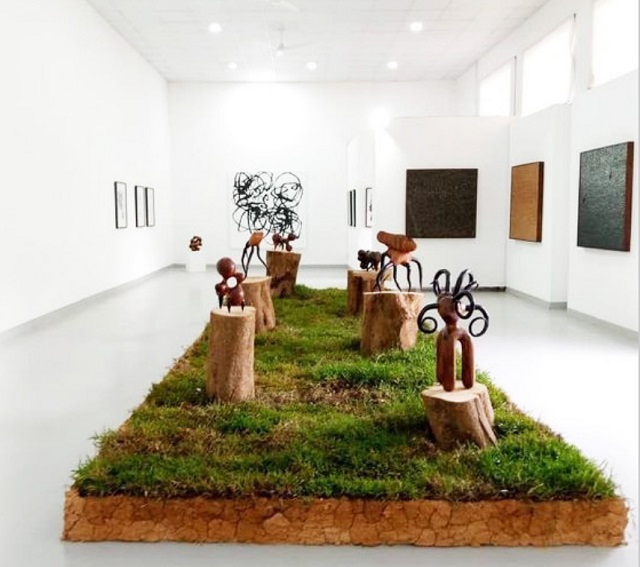
Wasswad boldly cuts into ambiguity of nature and science
Kampala, Uganda | DOMINIC MUWANGUZI | Wasswa Donald’s aka Wasswad latest solo show is called ‘Down in Napak’. That title quickly provokes interest in anyone who has visited the northern district of Uganda before. Is the artist, through his work, paying homage to his recent visit to this remote district that few Kampalans are familiar with or he’s making a metaphorical allusion to a locale that is quite famous for its semi-arid vegetation and landscape? The latter, is partly the underlying inspiration for this multidisciplinary new body of work showing at Afriart gallery. Wasswad’s affinity to interrogate the subject of nature or environment sustainability through his art is well known since his early days as an artist. Previously, he has worked with hardwood, particularly albizia (mugavu) as a gesture to the concept of human behaviourism and regeneration of nature; the wood is cut and repurposed to create new life forms in form of figurative sculptures, specifically, startling impressions of extra – terrestrial objects.
His latest exhibit reverberates with similar presentation and representation with a focus on the concept of human behaviourism within the concept of the immediate surroundings. The artist conceives this body of work responding to the increasing global trend in science and technology where human beings are increasingly creating -generating and regenerating- manimals to symbolise the idea of nature’s evolution. Such critical interrogation pervades the artwork: from the central organic installation aptly named ‘Down in Napak’; measuring more than five feet long; to the figurative figurines of extraterrestrial-like sculptures and ink line drawings hanging against a white washed background.
In a nutshell, ‘Down in Napak’ is a show interrogating the subject of evolution and adaptation within the context of the immediate surroundings. In this, the central installation from which the exhibit derives its name, ‘Down in Napak’, is an imagined space representing a park in the context of ecosystems in our immediate environment. Such metaphorical representation echoes the astuteness of the artist’s consciousness about nature and deft replication of this theme in his art.
More so, through the experimental processes that create this body of work, the artist reveals a more critical aspect of the studio as a laboratory for experimentation: constructing and deconstructing objects to finally create a series of artworks that are layered with myriad ideas, but also straddle the concept of design, architecture, and art.
While the artist ventures into this complex and sometimes ambiguous relationship between nature and science, his boldness to create purely abstract art for this exhibit cannot be ignored.
The artist through the process that is familiar to coding, intricately layers small geometrically designed leather cuttings recycled from different manufacturers over a period onto flamed plywood surfaces. The outcome of such extremely laborious undertaking is a creation of a series of abstract artworks namely Immortal Objects 1,2, 3, 4 &5, 2020 that will arrest the viewer’s gaze and mind at once: provoking them to ask questions about the processes of creating such abstract art, but also the underlying message carried throughout out the art. Wasswad is communicating the message of regeneration whereby the leather is repurposed in this exhibit to create starling abstract artworks. Similarly, through the concept of deforestation and reforestation, the artist creates the sculptures in the exhibit. The transformative processes undoubtedly define the artistic practice. Incidentally, there’s a nexus between artists working with the character and history of the gallery space.
The gallery is situated in a former warehouse, located in a busy industrial area that was repurposed into a transformative space that facilitates artists to create innovative and experimental art. More so, the character of the gallery space changes from time to time depending on the art being showcased.
The show is curated by Michelle Mlati and is now showing at Afriart Gallery, on 7th Street Industrial Area, Kampala.
****
 The Independent Uganda: You get the Truth we Pay the Price
The Independent Uganda: You get the Truth we Pay the Price



